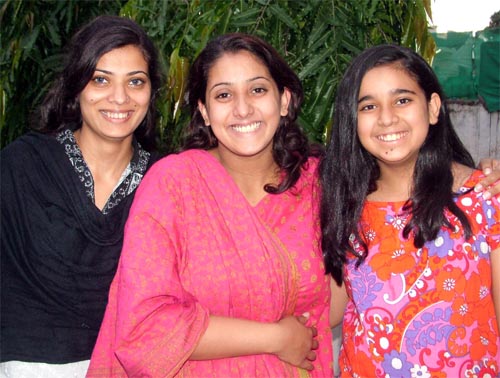Dec 22, 2025
Dec 22, 2025
Bhopal, the City of Begums, recently witnessed a 'nikah' (Muslim marriage ceremony) that took many by surprise and broke some myths. But interestingly, the fact that the 'rukhsati' (when a bride leaves her parental house) would entail the groom bidding adieu to his family and heading off to England was not the highlight of this unique affair. It was a marriage with a difference because two of the bride's sisters - Rahia, 19, and Sana, 17 - became the witnesses to the wedding of their sister and signed on the 'nikahnama' (marriage certificate). Further, their youngest sibling, Ana, a school-going 14-year-old played the role of the 'wakeel' (the facilitator who conveys the bride's consent to the groom's family) at the time of the marriage ceremony. A 'nikahnama' is signed at the time of this ceremony by the 'qazi' (priest), the bride, the groom and witnesses from either side. This written agreement is then announced publicly.
The resplendent bride, Sadaf, 21, a law student, had traveled all the way from her home in England to marry Syed Amir-ul-Hasan Naqvi, 24, a software engineer. The venue for the ceremony was the historic Taj-ul-Masajid (crown among mosques), one of Asia's largest mosques, built by Nawab Sultanjahan Begum, a queen, poet and writer. (Bhopal, the capital of Madhya Pradesh in central India, is famous for its progressive queens - the Begums - who ruled the erstwhile princely state from 1819 until 1947.)

Dr Sarwar, the father of the bride, said, "I am happy that my daughters were witness to the marriage of my fourth daughter. Islam permits women to act as witnesses in a marriage. Therefore, my daughters put their signatures on the 'nikahnama'. My daughters had obtained the information after searching through several Islamic websites on the Internet."
Rahia, a medical student like her younger sibling, Sana, revealed that Sadaf had always been keen that her wedding be unique. Incidentally, the bride is happy that she was able to go ahead with her plans "without much protest from the clerics". For the groom, the wedding has been a learning experience. Until he married Sadaf, Amir was under the impression that women could stand as witnesses only in the absence of a man.
The groom's father, Professor Zia-ul-Hasan, said neither he nor his family had any reservations, as such a provision does exist in Islam. Majid Khan, 55, a guest at the wedding, said that it was the first time he had heard of women signing as witnesses. Another guest, Mufti Mahfooz Ilahi added that though it was not common, he saw nothing wrong in what the girls had done.
Sadaf's marriage has thus debunked a social practice, whereby only men have testified at a 'nikah'. The step highlights the emerging attitude of the educated Muslim youth and their desire to read about and understand their faith. Times sure are changing and customs are becoming hi-tech, with 'nikahs' taking place through the Internet and via video conferencing.
According to Islam, marriage is a sacred, social, revocable contract between a bride and groom. Both parties mutually agree and enter into the contract. Either side has the liberty to define various terms and conditions of their liking and make them a part of this contract. The primary requirements of any Muslim marriage are the mutual consent of the bride and groom, two sane adult witnesses and 'Mahr' or marriage gift, which is given by the groom to bride.
However, while Dr Sarwar may be pleased with his two daughters acting as witnesses and think it a pioneering effort, there are those who are more ambitious. Nusrat Bano Ruhi, state president of the Indian Federation for Women, feels this is not enough. She remarked, "In Islam, the testimony of two women is considered equivalent to the testimony of one man. The marriage would have been termed pioneering, had only one sister stood witness rather than two in place of one man."
09-Sep-2007
More by : Shuriah Niazi